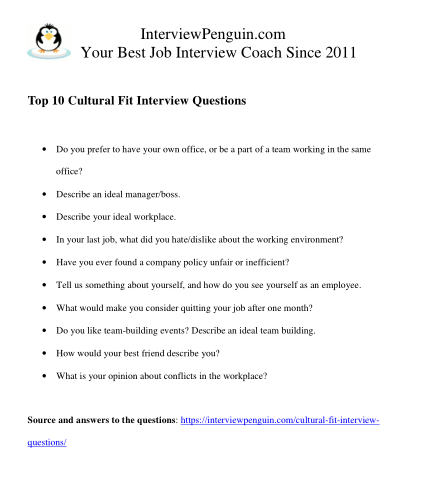“Cultural fit” is yet another buzzword we can hear quite often in the interviews in big corporations. Companies try to build a certain culture in the workplace, and to be honest, it doesn’t differ that much from one big corporation to another. Everywhere they expect you to work hard and stay overtime, to show initiative and proactive approach to work, to respect the corporate hierarchy, and at the same time show creativity in the fitting moments.
Having said that, some differences still exist–in the organization of the workplace, reporting duties, number of meetings each day, communication channels between the employees, dress code, and other minor details. Let’s have a look at some questions you may face while the hiring managers try to understand whether you will fit their company culture–or at least what they consider their company culture.
Table of Contents
Do you prefer to have your own office, or be a part of a team working in the same office?
A good answer depends entirely on your observations–whether they prefer open office in the company, or whether the workers like you (coders, managers, analyst, or whatever job you apply for) have their own offices.
Open offices are ever more present (not that they result in better productivity, but companies can house three times more employees in the same space, which reduces rent considerably), and if you are not sure what they prefer in the company, go for saying that you prefer to share the office with other employees.
You can add that you are not distracted by the noise and chatter of other colleagues, and can focus on your job while working in an open office environment.
Describe an ideal manager/boss
Again, your answer should accord with the findings of your research. If one-on-one meetings are common in the company, if feedback flows freely in all directions, you can say that you like to have a daily contact with your manager, and open discussion about everything.
In an opposite case (common in some engineering and programming jobs), when employees work a lot on their own, and are responsible for making daily decisions, you can say that you do not expect much from your boss, that you are independent and can work without constant supervision and guidance.
In any case, you should not refer to race, color, gender, age, or religion of your ideal boss. Saying that you prefer to work under an older boss might easily backfire–if your prospective superior was a young lad…
May also interest you: Situational interview questions.
Describe your ideal workplace
Speak rather about the effect an ideal workplace should have on you and your performance in work, than about some factual things about the workplace, such as sizes of the offices, dress code, code of communication, etc.
You can say, for example, that you prefer workplace that encourages communication on all levels of management, that you like workplace where people share common spaces and it encourages them to meet and interact together, etc.
You can also say that you like to have clear goals for each month and year. This will work in most modern corporations, because they set monthly goals for nearly every employee…
* Special Tip: Interview questions about cultural fit aren’t the only tricky questions you will face while interviewing for a job in any Fortune 500 corporation. If you want to avoid “interview headaches”, and finally streamline your preparation for the big day, have a look at our Interview Success Package. Up to 10 premium answers for each difficult interview question will help you stand out in the interviews, impress the hiring managers, and outclass your competitors. Thank you for checking it out!
In your last job, what did you hate/dislike about the working environment?
Obviously you should not talk about something that is characteristic also for your prospective employer. If they operated a big open office and people were constantly on the phone and talking, it would be a mistake to say that you disliked the noise in the offices of your past employer, that you could not concentrate.
Or if they often worked overtime, it would be a mistake to say that you hated the fact that everyone stayed at work until seven pm, though they could leave at five pm. But they didn’t leave–that was the culture…
Alternatively you can say that you did not dislike anything about the working environment, and quit for another reasons altogether.
Have you ever found a company policy unfair or inefficient?
If you decide to pick a policy and talk about it (and you definitely should if it was a reason why you left your last job), you should produce clear arguments, and explain how it was unfair not only to you, but also to other employees (show selfless attitude to your colleagues).
You can even say how it eventually backfired for the company. But try to speak in a calm voice, do not let the emotions get the better of you.
Other cultural fit interview questions you may face
- Tell us something about yourself, and how do you see yourself as an employee.
- What would make you consider quitting your job after one month?
- Do you like team-building events? Describe an ideal team building.
- How would your best friend describe you?
- What is your opinion about conflicts in the workplace?
- …
Special Tip: Download a full list of questions in a simple, one-page long .PDF, and practice your interview answers anytime later, even when offline:

Things you have to understand to come up with the right answers
Questions about cultural fit are rather tricky, for the following reasons:
- Big corporations (over five hundred employees) are typically too diverse to maintain the same culture in the entire company. It will differ from one department to another.
- Things are not always obvious, and unless clearly defined on their website (or internal documentation), a desired company culture is often a mystery even for the managers who lead the business.
- Culture evolves with the company, the situation in the particular industry, or with the entire economy. Things work differently in recession, and some companies can grow from ten to a hundred employees in a year. Needless to say, many things will change in this process, and culture is often one of them…
Do a good research about their working culture
Before you will go to your interview and answer their questions, you should do an extensive research about the business.
An obvious idea is to check their mission statement, vision & goals, and other things they advertise on their website. This will give you an idea of what culture they want to build in the company (which does not necessarily reflect the reality in the workplace).
Therefor you should also browse websites such as Glassdoor, check references from past employees of the company, to understand more about the real working environment and culture in the company (when reading their reviews keep in mind that some of these people were fired, and there might be some bitterness in their answers–take the negative remarks with a grain of salt, it should not discourage you from applying).
Learn the culture from the interviewers
Interview itself (and what happens from the moment you enter the building of the corporation) will tell you the most about the culture they try to foster in the workplace.
Subsequently it will help you to understand how to answer their questions, or even (at least to some extend) how to act in your interview, to present yourself as a good fit.
- What clothes do they wear? Receptionists, HR people, other employees?
- Is the receptionist very formal? And what about the interviewers?
- Are other employees hanging around, talking informally, enjoying their time, or is everyone seated at their table, watching their computer screen, saying nothing?
- Can you see more people sharing the offices? How many of them? Two, ten, fifty?
- Do you notice any places for leisure? Balcony for smokers, table soccer, billiard table, small kitchen?
- How do they talk to you in an interview? Is everything extremely formal? Do they wear poker faces, or are they rather friendly and relaxed?
You see, there are many things you can, and should observe, before the interview and also once you are in the company. They will help you to understand better the real culture in the corporation (which may differ a lot to the proclamation on their website). And it will also help you to find the best possible answers to their questions…
Non verbal communication matters
What you say is one thing, what you do another. Skilled interviewers and HR managers do not need to ask you any questions about cultural fit. Talking to you in an interview for an hour, they will be able to say whether you can fit in the company, with your character, attitude to work, communication, expectations, and other things.
They will simply carefully observe both your verbal and non-verbal communication, and make their decision. Check our article about body language in an interview, to understand how to say the right things without words.
Needless to say, many HR managers and interviewers do an average job, and they need the cultural fit questions to help them to understand whether you’re a good fit. The corporation may also outsource their recruitment, and the person leading an interview with you might never even visit the corporation. Also in this case, the questions make sense…
Summary and next steps
In my opinion and experience, company culture is often overrated, misunderstood, or even utterly useless for the corporation. An empathic person who is not blinded by prejudice and selfishness, can get along anyone, and will fit into any team.
But many companies see things differently–and perhaps they have a point. They try to build cults in the workplace, they try to differentiate from all competitors (sometimes in a rather extreme manner), and they do all of this to attract talent, to stand out with their job offers.
For this reason they may use some cultural fit interview questions, or they may consider it extremely important whether you’d fit their culture or not. Prepare for the questions from this article, and research about the company and the culture they try to foster.
At the end of the day, remember that interview itself (the way people conduct themselves, and the things you see in the company) is the most accurate indication of the real culture in the workplace. Act accordingly in your interview, and in most cases it will be enough for them to consider you a good cultural fit.
I wish you good luck!
May also interest you:


